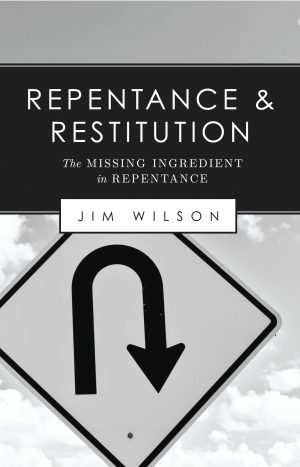-
 Hope is a promise of God. Anxiety is a lie of Satan. When we are anxious, we become immobilized. We cannot make decisions; we cannot get things done; we cannot sleep. What can we do to be free from this constant worry? “Fear not, for I am with you; be not dismayed, for I am your God; I will strengthen you, I will help you, I will uphold you with my righteous right hand” (Isa. 41:10). “So do not worry, saying, ‘What shall we eat?’ or ‘What shall we drink?’ or ‘What shall we wear?’ For the pagans run after all these things, and your heavenly Father knows that you need them. But seek first his kingdom and his righteousness, and all these things will be given to you as well” (Matt. 6:31–33). “Cast all your anxiety on him because he cares for you” (1 Pet. 5:7). In this booklet, Jim Wilson teaches you how to trust God and be free from anxiety every day. God knows our needs, God is faithful, and He cares for you.
Hope is a promise of God. Anxiety is a lie of Satan. When we are anxious, we become immobilized. We cannot make decisions; we cannot get things done; we cannot sleep. What can we do to be free from this constant worry? “Fear not, for I am with you; be not dismayed, for I am your God; I will strengthen you, I will help you, I will uphold you with my righteous right hand” (Isa. 41:10). “So do not worry, saying, ‘What shall we eat?’ or ‘What shall we drink?’ or ‘What shall we wear?’ For the pagans run after all these things, and your heavenly Father knows that you need them. But seek first his kingdom and his righteousness, and all these things will be given to you as well” (Matt. 6:31–33). “Cast all your anxiety on him because he cares for you” (1 Pet. 5:7). In this booklet, Jim Wilson teaches you how to trust God and be free from anxiety every day. God knows our needs, God is faithful, and He cares for you. -

Men were designed, created, and commanded to bear responsibility, but our history of failure in this area stretches all the way back to Adam. Today irresponsibility is considered normal, even a birthright. Jim Wilson outlines the causes and results of this failure, the biblical principles and characteristics that define a responsible man, and how men can apply them both in their own lives and in raising their sons.
Masculinity does not have to be proved with muscularity, sexual prowess, or bragging. True masculinity is established by taking up the responsibility God has given you.
-

Rejoice in the Lord always: again I will say, rejoice. (Phil. 4:4 NKJV)
Restore to me the joy of your salvation and grant me a willing spirit to sustain me. (Psalm 51:12)
Have you ever felt like you are just wasting away, like your strength is sapped? The normal Christian life is a life of joy. Yet many (if not most) Christians are not consistently joyful. What is it that keeps us from obeying the command to rejoice always? Often, it is unconfessed and unrepented sin that hinders us from living a life of joy.
In this short booklet, Jim Wilson shares the story of his early Christian walk and his journey towards understanding the connection between repentance and rejoicing in the Lord. With Scripture, graphs, and clear explanations, he helps us see how failure to confess sins quickly steals our joy and how keeping short accounts—both with God and with others—sets us free to rejoice in the Lord no matter the circumstances.
-
 You love God. You love your kids. So why don’t they love Him? God promises lovingkindness to a thousand generations for families who love and obey Him (Deut. 7:9). Why are children who grew up in Christian homes leaving the faith, and how do we get them to come back? No matter how old your children are, there is a solution. With decades of pastoral wisdom, Jim Wilson identifies the common causes of rebellion and helps parents apply the eternal truths of Scripture to “turn the hearts of the parents to their children and the disobedient to the wisdom of the righteous—to make ready a people prepared for the Lord” (Luke 1:17).
You love God. You love your kids. So why don’t they love Him? God promises lovingkindness to a thousand generations for families who love and obey Him (Deut. 7:9). Why are children who grew up in Christian homes leaving the faith, and how do we get them to come back? No matter how old your children are, there is a solution. With decades of pastoral wisdom, Jim Wilson identifies the common causes of rebellion and helps parents apply the eternal truths of Scripture to “turn the hearts of the parents to their children and the disobedient to the wisdom of the righteous—to make ready a people prepared for the Lord” (Luke 1:17).
-
 We love our kids, but do we love like God loves....without conditions, reservations, or reluctance? In this excerpt from his popular book How to be Free from Bitterness, Jim Wilson identifies the troublesome consequences of insufficient parental love and points readers to the glorious fruit of superabundant kindness, and patience and helps parents apply the eternal truths of Scripture to grow peace and joy in their homes.
We love our kids, but do we love like God loves....without conditions, reservations, or reluctance? In this excerpt from his popular book How to be Free from Bitterness, Jim Wilson identifies the troublesome consequences of insufficient parental love and points readers to the glorious fruit of superabundant kindness, and patience and helps parents apply the eternal truths of Scripture to grow peace and joy in their homes.
-
 Jesus’ death paid for our sins - the guilt, the death, and the punishment. Jesus does not repay the man who got ripped off when we stole from him. According to the Bible, the person who comes to the Lord in repentance is to pay the one he stole from the value of the stolen goods plus one fifth of the value. But what if it is a candy bar you took twenty years ago? The amount stolen and the time since the theft do not make it yours. There are many Christians who are living subnormal Christian lives because they are too proud or too afraid to make restitution. They are like people with low-grade fevers; they are not sick enough to be in bed, but too sick to do anything worthwhile. Even if no one knows about the thefts, these Christians are poor witnesses for Jesus Christ. They may have confessed and repented in words, but if they do not make restitution, it is not true repentance, and they are not forgiven.
Jesus’ death paid for our sins - the guilt, the death, and the punishment. Jesus does not repay the man who got ripped off when we stole from him. According to the Bible, the person who comes to the Lord in repentance is to pay the one he stole from the value of the stolen goods plus one fifth of the value. But what if it is a candy bar you took twenty years ago? The amount stolen and the time since the theft do not make it yours. There are many Christians who are living subnormal Christian lives because they are too proud or too afraid to make restitution. They are like people with low-grade fevers; they are not sick enough to be in bed, but too sick to do anything worthwhile. Even if no one knows about the thefts, these Christians are poor witnesses for Jesus Christ. They may have confessed and repented in words, but if they do not make restitution, it is not true repentance, and they are not forgiven. -
 In Christianity and all religions that claim to be Christian, there is a promise of salvation. The promise may be conditional, or it may be positive, but it will be based on either doctrine or works. This booklet gives nine biblical, experiential evidences of salvation. When a person compares his experiences with those described in the Bible, he may come to one of several conclusions:
In Christianity and all religions that claim to be Christian, there is a promise of salvation. The promise may be conditional, or it may be positive, but it will be based on either doctrine or works. This booklet gives nine biblical, experiential evidences of salvation. When a person compares his experiences with those described in the Bible, he may come to one of several conclusions:- He thought he was not saved, but he finds out that he is.
- He thought he was saved, but finds out he isn't.
- He thought he was not saved, and that is confirmed.
- He thought he was saved, and now he knows that he is.

